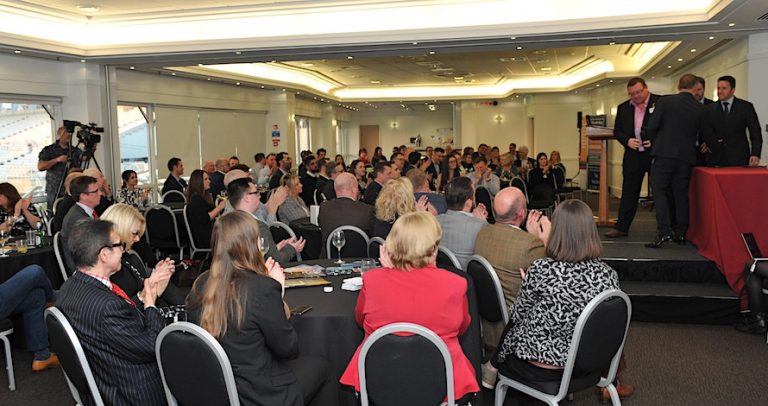A major new research centre set to position the UK as a global leader in clean technology by replacing fossil petrochemicals and recycling industrial waste using sustainable chemistry, is being launched by researchers at the universities of Sheffield, Newcastle and Nottingham.
As referenced in the UK government’s recent Industrial Strategy, Great British (GB) Chemicals brings together researchers from a total of 10 universities who will work with stakeholders throughout the chemical industry to produce cleaner versions of the chemicals that we depend on in our modern lives, to reduce pollution, ensure resilience, and secure economic sustainability.
The centre is funded by the Engineering and Physical Sciences Research Council (EPSRC) and the Natural Environment Research Centre (NERC).
Led by Professor Peter Styring from the University of Sheffield, and Professors Libby Gibson from Newcastle University and Mike George from the University of Nottingham, GB Chemicals aims to accelerate the deployment of world-leading laboratory research through real-world demonstration and validation, and promote UK investment, job creation and potential export markets for the chemical industry.
Kedar Pandya, executive director for strategy at EPSRC, said: “This investment by EPSRC and NERC will drive a sustainable chemical industrial future, shifting the UK away from environmentally harmful processes towards circular alternatives that improves peoples’ lives and drive economic growth.
“Working closely with industry partners, this will be a systems approach that optimises the interdependencies between environmental net gain, decarbonisation, and resource efficiency.
“By embedding environmental science within manufacturing solutions, we’re enabling an environmentally sound net zero transition that has a positive impact on biodiversity, ecosystems, and natural resources – aligning with priorities in the clean energy industries sector plan.”
Professor Peter Styring, professor of Chemical Engineering and Chemistry at the University of Sheffield and co-director of GB Chemicals, said: “The award of Great British Chemicals reflects a great effort by our 10-university team to put a sustainable chemicals industry at the forefront of a long-needed transition.
“We will take emissions from foundation industries to provide the feedstocks to drive future chemicals production. One of the things that shone through during the process was the enthusiasm of the team to succeed and to help develop a world-leading new chemicals sector.
“There will be challenges: technical, economic and social, however we have the right team to deliver that to where there are currently gaps, and we have the flexibility in funding to bring in new partners and stakeholders.
“We already have combined experience in developing technologies to pre-commercial systems and we have shown that working as teams on a consolidated whole systems approach can deliver results at an accelerated pace. Co-creation with our stakeholders can drive that even more when we work together as a focused team.”
Professor Libby Gibson, professor of Energy Materials at Newcastle University, and co-director of GB Chemicals, said: “I’m delighted that we have been awarded the opportunity to lead Great British Chemicals. Carbon from the petrochemical industry is embedded in almost every manufactured product.
“If we want to cut pollution, improve health outcomes, become more resilient, grow the economy, provide jobs and keep products affordable, we need to urgently accelerate the deployment of smarter technology that keeps carbon in use rather than digging it up and then discarding it.
“This award enables us to unlock that opportunity, by driving innovation from the lab bench to the industrial backbone through our partnerships, pilots, data, and training. Ultimately, this will enable the community to secure investment, strengthen policy and create a lasting benefit for the planet.”
Professor Michael George, professor of Chemistry at the University of Nottingham, and co-director of GB Chemicals, said: “The UK chemical using industries are an under-appreciated jewel in our country’s economy. I am thrilled to be part of Great British Chemicals, helping to shift this sector towards sustainable operations. Success needs the participation of our wide range of university and industrial stakeholders focusing on the skills agenda.
“Our centre recognises the vital role of technical professionals in research across academia and industry. This includes partnership with the UK Institute for Technical Skills and Strategy, aligning with the Technician Commitment to support visibility, opportunity and the sustainability of skills.”
Great British Chemicals is funded by the Engineering and Physical Sciences Research Council and the Natural Environment Research Council, both part of UKRI. The centre will be funded at a full economic cost of £22.5 million for seven years.
GB Chemicals will begin officially on 1 August 2025, although work has already begun to ensure the consortium hits the ground running.










 Winners will be revealed at a glittering awards ceremony on Thursday 2nd October, at the Trent Bridge Cricket Ground (4:30pm – 7:30pm) – an evening also offering an opportunity to establish new connections with property and construction professionals from across the region, and hear from keynote speaker Councillor Nadine Peatfield – Leader of Derby City Council, Cabinet Member for City Centre, Regeneration, Strategy and Policy, and Deputy Mayor of the East Midlands.
Other award categories open for entry include: Most Active Agent, Developer of the Year, Responsible Business of the Year, Residential Development of the Year, Contractor of the Year, Deal of the Year, Architects of the Year, Excellence in Design, and Sustainable Development of the Year. All entry forms can be accessed
Winners will be revealed at a glittering awards ceremony on Thursday 2nd October, at the Trent Bridge Cricket Ground (4:30pm – 7:30pm) – an evening also offering an opportunity to establish new connections with property and construction professionals from across the region, and hear from keynote speaker Councillor Nadine Peatfield – Leader of Derby City Council, Cabinet Member for City Centre, Regeneration, Strategy and Policy, and Deputy Mayor of the East Midlands.
Other award categories open for entry include: Most Active Agent, Developer of the Year, Responsible Business of the Year, Residential Development of the Year, Contractor of the Year, Deal of the Year, Architects of the Year, Excellence in Design, and Sustainable Development of the Year. All entry forms can be accessed 














